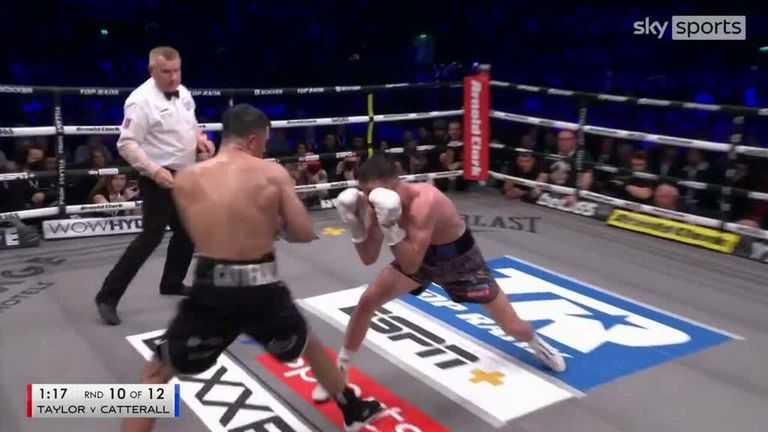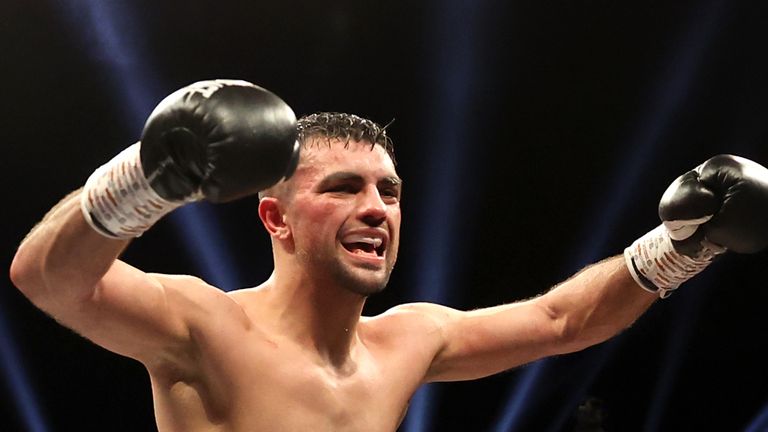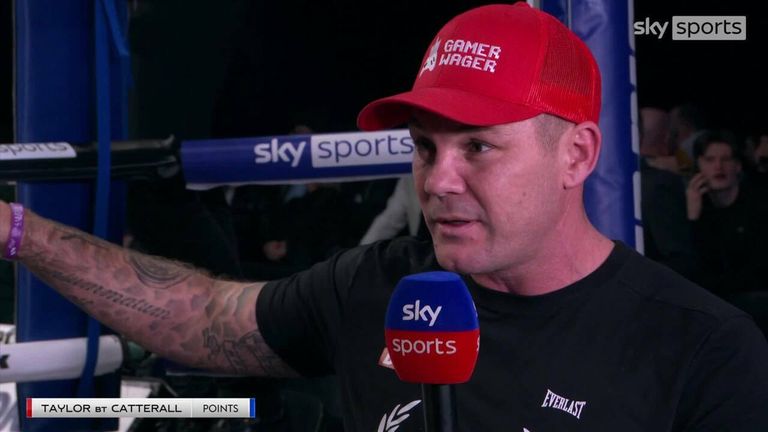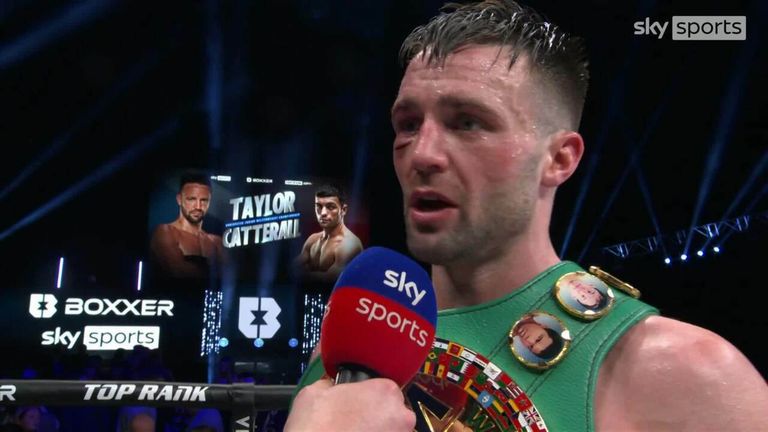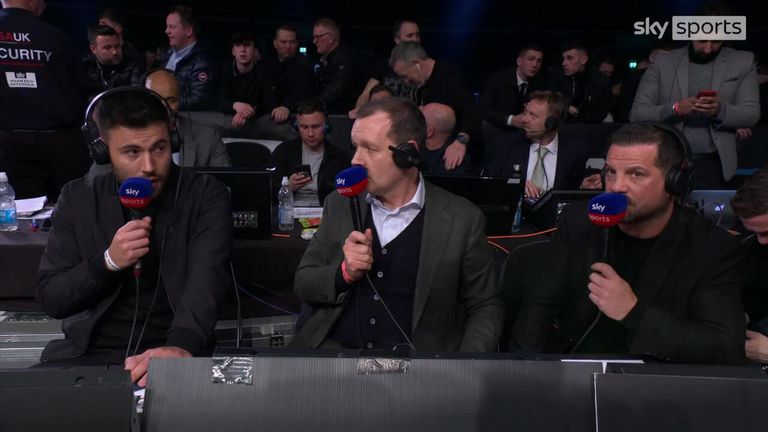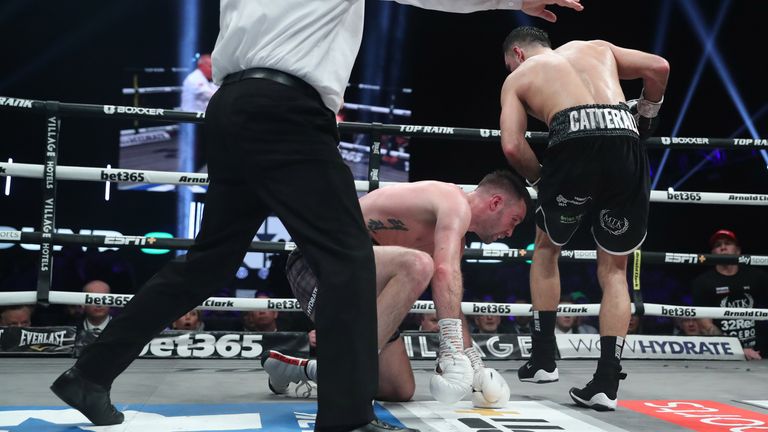Josh Taylor's controversial points victory over Jack Catterall - could it have been avoided?
Josh Taylor beat Jack Catterall on a split decision on Saturday to retain his undisputed champion status of the super-lightweight division; Sky Sports' Matthew Macklin assesses how controversial decisions in boxing can be avoided
Tuesday 1 March 2022 11:47, UK
An undisputed world title fight between Josh Taylor and Jack Catterall that should have been the climax of an incredible month for British boxing has ended with an investigation into the highly controversial scoring of the bout, but could it all have been avoided?
Taylor retained his undisputed champion status of the super-lightweight division via a split decision in his Scotland homecoming on Saturday, despite being knocked down, cut and out-boxed by Catterall for long periods.
The British Boxing Board of Control announced on Monday that it will investigate the scoring, which saw two of the three judges award the fight to Taylor.
Taylor, who was a heavy favourite for the bout, said after the fight he didn't see "any need" for a rematch, and confirmed his intention to move up to the welterweigh division.
Catterall, who was described as "heartbroken" by his team, did not speak to the media after the fight, but wrote on social media on Sunday that he had his "dreams stolen".
Former European middleweight champion Matthew Macklin, who commentated on the fight, sat down on Monday with Sky Sports News to explore the options for ensuring an avoidance of such controversial decisions in future.
'It was a decisive win for Catterall'
Macklin was unified with the rest of the Sky Sports team in Glasgow in believing Catterall had done more than enough to become world champion.
"I've got to be honest, I thought it was a pretty decisive win," Macklin said. "I didn't think for a second that Taylor was going to get it. I didn't think it was a debatable decision, I didn't think it was close on the night.
"Yeah it was scrappy and there were close rounds, but I thought Catterall was winning them, certainly the first half of the fight, and then he got the knockdown as well - it was like unless Taylor gets a knockout or a couple of knockdowns, he's not going to win this even if he wins every round.
- British Boxing Board to investigate Taylor-Catterall scoring
- Taylor claims controversial split decision win
"When the bell did go, there's a picture that's gone round, and a picture tells the story - you see the face of Catterall celebrating and Taylor with his arm raised but with the look of a beaten man."
Does crowd noise have too much influence?
While Macklin accepts there is no easy or obvious fix for the sport's bosses, he can see several areas of the current system that must be questioned.
One element likely to have aided Taylor in Glasgow was his vociferous home support. Despite the passionate Scottish crowd being subdued for much of the fight due to Catterall's dominance, every bit of success Taylor did have was met by roars.
Home advantage is acknowledged as factor in boxing - and many other sports - with the impact fans can have on officials a major part of that, and Macklin thinks simply providing judges with ear muffs to block out the crowd could help.
"It could be unconscious bias, but I don't think that's the case, these are experienced judges," Mackling said. "I don't believe there's any corruption, I think if anything it might be incompetence.
"Maybe swaying with the crowd, so in terms of taking that out the equation, maybe judges wear ear muffs which silence all noise, so they're literally watching the fight in silence and just seeing punches landing or not.
"It's not always easy to know did they land or did they miss, but the crowds roaring and they think it must have landed."
'Judges should face three-strike system'
Howard Foster scored the bout 113-112 to Catterall, but Victor Loughlin gave it to Taylor by the same score-line reversed, and Ian John-Lewis scored it 114-111 in the Scot's favour.
Macklin believes that John-Lewis should face some sort of action over the egregious nature of this scorecard, with a three-strike system being one possibility.
"It was a bad one," Macklin said. "I didn't think Saturday night could go either way, I thought it was conclusive. How Ian John-Lewis had that 114-111 to Taylor, I just cannot understand it.
"I think if you've had stinker, then maybe it's three strikes or something, you have a stinker like that, that's a strike, then two or three and you're out."
Would five judges help?
In Olympic boxing, a result is drawn from the observations of five judges, compared to three in the professional game.
Macklin accepts that having more judges should in theory lower the possibility of the wrong result being reached, but points out that human error is still in play, with the Olympic system having been far from perfect over the years.
"Do you bring more judges in? You can bring more judges in but they're still human, you're still going to get human error," Macklin said.
"We had three judges at the Olympics and that became five, the reality is you can easily get 3-2 as you can 2-1. The more you use, statistically you're giving yourself a better chance, but they're still human."
Macklin also believes that judges are sometimes given too harder time over genuinely close decisions.
"I think what's a problem in terms of public perception is there are too many really close fights where people scream 'robbery'," Macklin said.
"It's every week, whoever's on the wrong end of a close fight, claiming robbery. What happens then, that dilutes it when there is a robbery. Saturday night for me that would go down as a robbery, like Golovkin-Canelo, the first one, would go down as a robbery."
Does the scoring system work?
Another defence of the judges is that they are somewhat hamstrung by professional boxing's '10-point must' scoring system.
Judges are required to award 10 points to at least one fighter for each round (before deductions for fouls), meaning that the outcome can be the same award of points made for rounds that are extremely tight and ones where a fighter has been totally dominant.
Macklin said: "Is the 10-point must system flawed?
"Because what if a guy wins seven rounds by the skin of his teeth, where they probably could have gone either way, but then the last five rounds the other guy dominates him but still only wins five rounds?
"He'd lose the fight, but that wouldn't really be a fair reflection of the fight and everyone would scream robbery, but on the 10-point-must system, the guy that won the seven close rounds win the fight."
VAR in boxing?
Macklin is wary of introducing technology to boxing, citing the example of the mixed reception Video Assistant Referee (VAR) has had in football.
"I think in sport you've got to be careful," Macklin said. "We all want to iron out human error as much possible, but I think a lot people would say VAR has been a nightmare, and they'd nearly rather take the rough with the smooth of the human error element, than have the slowing of the game up all the time."
However, Macklin is open to the idea of introducing a video-replay element to the current process.
He suggested a system that would see judges given screens at ringside where at the end of each round they would be sent a 20-second montage of the key moments of the round, potentially helping them come to a more accurate conclusion.
"Sometimes it's happening quick, you can't see the shot landing, but then on a replay you can see whether it was a clean shot or it missed," Macklin said.
"Maybe if the judges could 20 seconds of clips at the end of the round - 20 seconds to think about the round while the replays are clipped together, 20 seconds to watch the clips and then 20 seconds to make their mind up, maybe something like that. It just gives you a second look at things."
'Catterall must get another shot'
While Catterall has likely missed his chance, for now, of becoming undisputed champion, Macklin is optimistic the Chorley fighter will immediately be given another world title shot.
"You'd like to think that the sanctioning bodies will reinstate him as mandatory challenger, so he'll get to fight for one if not all of the vacant titles," he added.
"I don't know what way they'll do it, but you'd like to think if the title becomes vacant, he gets a shot at whichever one. He's got to get another crack at it."
Asked about the prospect of Catterall getting another immediate attempt to become undisputed champion, Mackling said: "That's unrealistic, but certainly this was a WBO mandated one, so for that one at least he should be back in for the vacant title."


